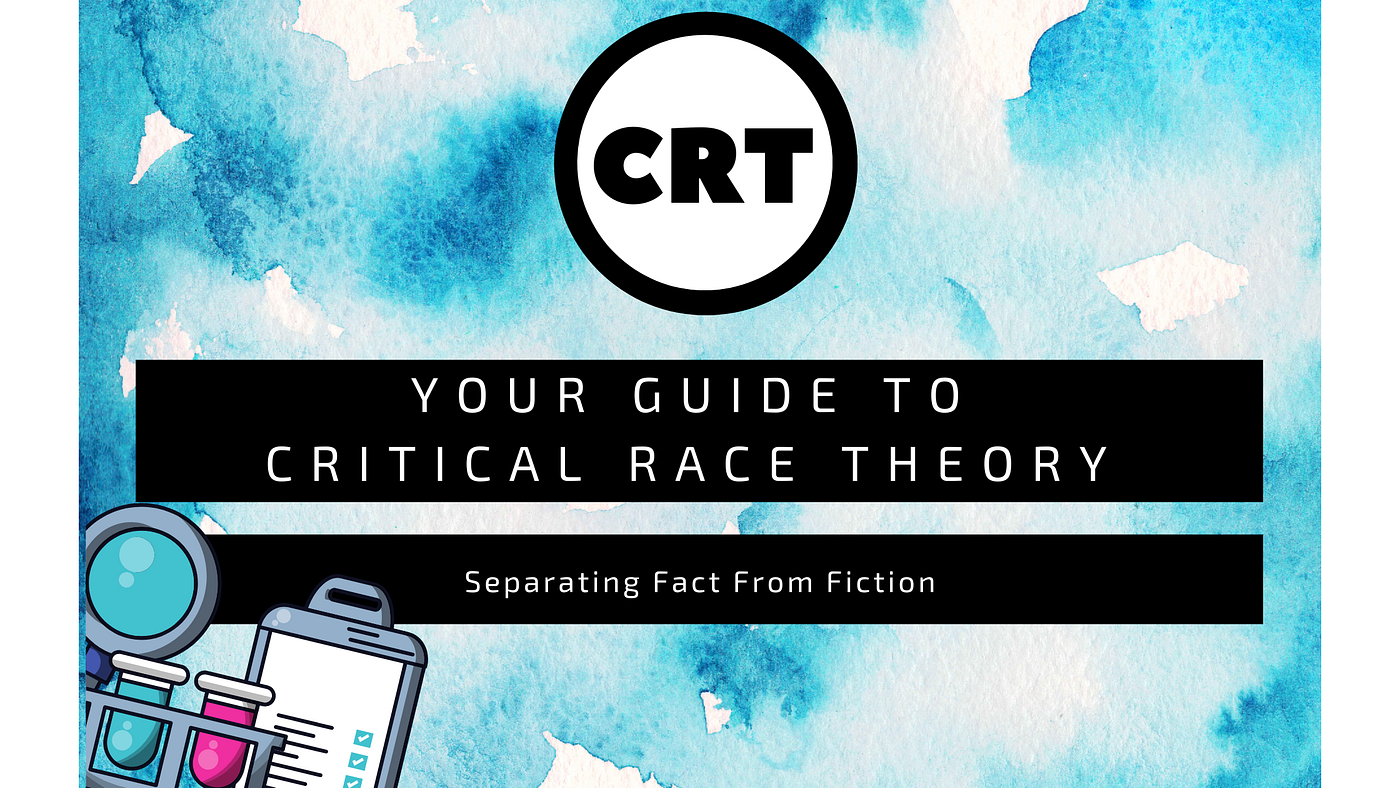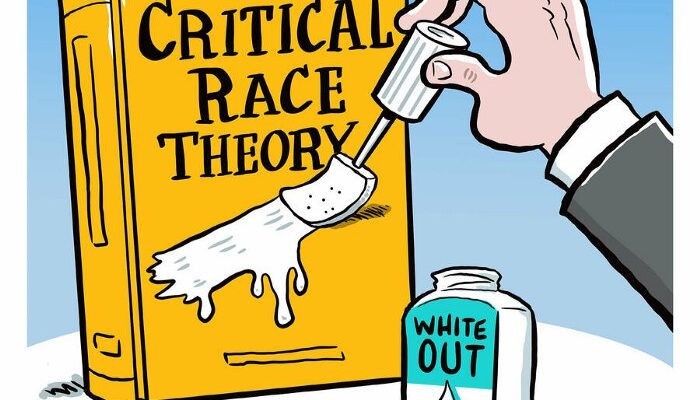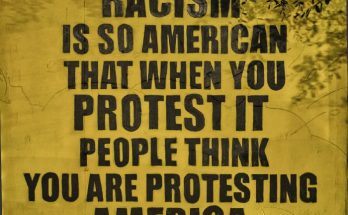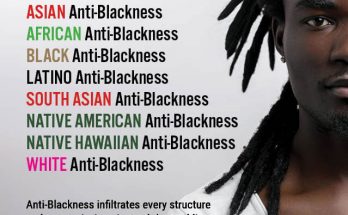White People Fear ‘Critical Race Theory’ Out of Ignorance
Separating fact from fiction.
Written by Allison Gaines for Medium. Illustration by Terry Laban
AsAmerica emerges from its socially distanced bubble, “critical race theory” continues to dominate headlines. For those basking in white privilege, critically evaluating the racial caste system feels terrifying. They fear tectonic plates shifting beneath our social landmass.
Our nation is in the process of exchanging color-blind ideology with anti-racism. White people will have to take a good, hard look in the mirror and into their family albums. Some are afraid of the skeletons they will find, and others are leery of the theory that will make them take a look in the first place.
White people want to focus on selected parts of American history, lionizing their role. Many choose to ignore that the gap between Black and white homeownership is wider than it was 50 years ago. Or that Black families have one-tenth the wealth as white ones. Currently, Black people are 3.25 times more likely to die in police encounters.
Acknowledging disparities means white people would feel pressure to address inequalities, something many would rather ignore.White people who fear critical race theory ironically oppose the very theory which could provide them cultural competency. And while any Black writer could compose a saga on the nonchalance of white Americans, there is another factor at play here. Most white people do not understand critical race theory. They simply oppose it at face value.
Society loves to give white people the benefit of the doubt. When conservatives like Mitch McConnell or Donald Trump call critical race theory un-American, people assume they understand what they oppose. They’ve called the theory Marxist, attempting to conflate critical legal studies (CLS) with critical race theory (CRT). Nuance means nothing to those attempting to distort a powerful message.
If you think that white people do not need to understand critical race theory to oppose it, consider the following. Imagine that a man wants to disprove the theory of gravitation. He would have to first understand force, the gravitational constant, the mass of two objects, and the center of their masses. Then, he would need to show why this theory is false. To invalidate an established theory, someone has to show their work, demonstrate how it is faulty. Unless a man could defy the law of gravity, I doubt he would get his feet off the ground. More importantly, no one would take his critique seriously.
In society, disagreements are normal and, in some instances, can strengthen our resolve. However, basing your opposition on a lack of understanding is foolhardy. Americans should evaluate critical race theory, its tenets. Then, they can decide for themselves whether or not this theory is harmful or helpful for American school children.
What is critical race theory?

“Critical race theory recognizes that systemic racism is part of American society and challenges the beliefs that allow it to flourish.” (Karimi, 2021)
First things first. Critical race theory recognizes race as a social construct rather than a biological function. In other words, people who come from different races are not sub-humans or sub-species. We are all one race — the human race. Colorblind theorists love this part. But, they are not so keen on what follows.
Race is a social construct developed by white colonists. The subsequent laws of enslavement and segregation derive from a false theory of white supremacy. You may ask yourself, why is white supremacy a false theory? Simply put, differences amongst racial groups are due to environmental and social factors. So, the idea of white people being inherently superior to other races has no scientific merit. But, that did not stop scientists from claiming Black people were inferior.
Negroes, with their smaller brains and blood vessels, and their tendency toward indolence and barbarism, Cartwright told fellow doctors, had only to be kept benevolently in the state of submission. (Ruane, 2019).
Critical race theory does not assert that Black people are superior to other races. On the contrary, it posits that Black people are equal to other racial groups but have been systematically oppressed because of the creation of the racial caste system.
Secondly, critical race theory asserts that racism is systemic, not aberrational. While white people often view instances like George Floyd’s death as an anomaly, this theory postulates that racism is something people of color endure consistently in American society.
The third tenet asserts that Black people’s legal setbacks benefit white people. Consider the current fight for voting rights. Taking away access to Black people benefits white people. When Georgia Deputy Cody Griggers charged Black people with fake felonies, he acted on this point. He understood that holding Black people back strengthened the shrinking, white voting block.White Deputy Stripped Black People of Voting Rights — Charged Them With Fake Feloniesmomentum.medium.com.
The fourth tenet of critical race theory asserts that Black people endure “different radicalization,” resting on racial stereotypes. Othering Black people dehumanizes them, greenlighting acts of overt racism. Suddenly, it becomes okay to stop the Black man rather than the white one if you accept the racist premise that Black people are inherently dangerous.
Othering is ugly, as seen in Germany’s holocaust or America’s Trail of Tears. Different radicalization explains why slavery could persist in the first place. Critical race theory postulates that this dynamic takes place and continues to threaten people of color.
The fifth tenet of critical race theory is “intersectionality.” This theory hypothesizes individuals cannot be placed into a single, identifying box. For example, a Black woman is both Black and female. By viewing a woman as only Black, for example, society would fail to understand the way her womanhood impacts her lived experience. Critical race theory posits that people are dynamic and interdimensional.
Lastly, the sixth tenet asserts the need for a “voice of colour.” Critical race theorists believe that someone from the same group is the best person to speak for them. Under this theory, representation matters because a Black man would be theoretically more in tune with other Black men’s specific needs and experiences. As Tim Scott demonstrated, this theory is an approximation. Someone’s skin color or sex does not guarantee they would be the group’s best advocate. The theory simply postulates they would be more likely to be a better representative.
Critical race theorists believe in the power of “storytelling.” When Black people share their experiences, they help to inform the public about their perspective, hopefully shifting the social climate. Critical race theory contains different groups of thought. Legal scholars published the aforementioned tenets in 1989 at a Workshop on Critical Race to create more structure for their theory.
“Critical race theory is a practice. It’s an approach to grappling with a history of White supremacy that rejects the belief that what’s in the past is in the past, and that the laws and systems that grow from that past are detached from it,” said Kimberlé Crenshaw, a founding critical race theorist and a law professor who teaches at UCLA and Columbia University.” (Karimi, 2021)
Is Critical Race Theory Marxist?
Critical race theory is not the same as Marxism. For starters, CRT does not promote the same economic or political vision. Critical race theorists do believe, however, that traditional liberal movements have failed to deliver progress for Black people. Incrementalism and colorblind ideology has failed, so the natural progression is to focus on identities. That much is self-evidenced by the two-step forward and one step back civil rights struggle Black Americans experience. Critical race theorists advocate for structural change.
“Unlike CLS scholars, however, critical race theorists did not wish to abandon the notions of law and legal rights altogether, because in their experience, some laws and legal reforms had done much to help oppressed or exploited people.” (Britannica, 2021).
While some white conservatives would have the world think that critical race theory is attempting to destroy the government or the laws that keep us safe, they are either wholly ignorant about these theories or purposefully misleading people to frighten them. You be the judge. However, one thing is blatantly clear — critical race theory is not Marxist, and its supporters do not endorse communism.
Most white people do not understand critical race theory. They simply oppose it at face value.
Acknowledging America’s social hierarchy could provide much-needed healing in a nation, once torn apart by my ancestor’s seditious slavers. However, some white people rather make critical race theory into a boogie man. White people who fear critical race theory are using deflection 101. They will do anything to distract from their role in maintaining white supremacy.
Mitch McConnell Has a Conflict of Interest
White men like Mitch McConnell love telling Black people “no.” He took joy in blocking our first Black president Obama’s agenda and judicial nominations. For years, McConnell referred to himself as the Grim Reaper, blocking popular, progressive legislation. He wore this title with pride. Men like McConnell kill more than legislation; they kill dreams. Maybe they should call him Freddy Krueger instead.
White men often puff out their chests to declare, “I never owned slaves.” However, many of those same men could not say the same for their predecessors. The federal government compensated slave owners and slaves and their descendants received nothing. Over 150 years after slavery, Black people are still suffering from a staggering race-wealth gap.
White people continue to benefit from the forced labor of African slaves — they’ve inherited it. Mitch McConnell is the descendent of slave owners, and his family’s wealth is a testament to the back-breaking work of my ancestors. And while this stings, this is not all about feelings. Check the census information.

White people, whose families owned slaves, have the audacity to say they do not want to talk about critical race theory. I do not know who they think they are fooling with this “in the past” time nonsense. There is a direct link between his family owning slaves and the position he holds today. He is the embodiment of the policies they attempted to maintain. When a white man says we should not discuss critical race theory in schools, tell him, “I think thee doth protest too much.”
Where do we go from here?
“Critical race theorists hold that the law and legal institutions in the United States are inherently racist insofar as they function to create, and maintain social, economic, and political inequalities between whites and nonwhites, especially African Americans.” (Britannica, 2021).
If someone disagrees with critical race theory, respectfully ask them what in particular they take issue with. For example, do they deny that slavery occurred, that the subsequent Jim Crow laws maintained a racial hierarchy, that racial disparities continue to exist in the modern era? Or do they feel that injustices should persist or that we should never discuss inequities in American society? Then, ask them what evidence they have for these claims.
Many white people have chosen ignorance over enlightenment and want to demonize a theory they do not understand. Talking about America’s original sin is not unAmerican and white men wouldn’t be running from a conversation about race if they were truly proud of all American history. Burying undesirable aspects of this nation’s history create sycophants, not patriots. Critical race theory buts heads with American exceptionalism. It asks us to evaluate the racial, social hierarchy and to dismantle systems and beliefs that maintain inequalities. That’s the grand scheme. And if that vision of a diverse, inclusive, honest America frightens you, what does that say about your loyalty to democracy?
Read the original article here – https://readcultured.com/white-peoples-fear-of-critical-race-theory-is-based-in-ignorance-692de80ca5ad







